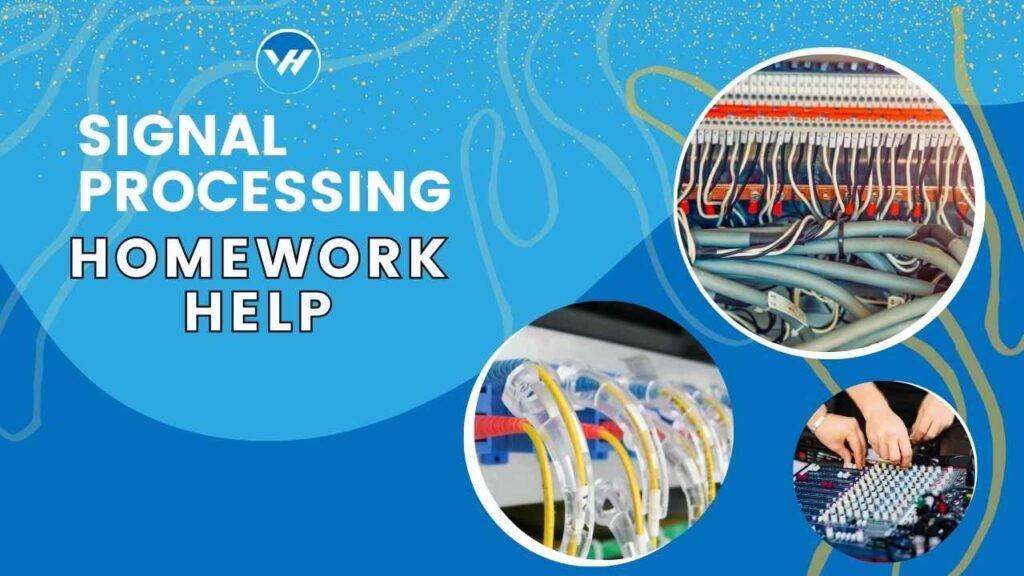Signal processing can often feel like navigating a labyrinth of algorithms and equations, especially when you’re knee-deep in homework. But what exactly is signal processing, and why is it so crucial?

Table of Contents
ToggleWhat is Signal Processing?
Basic Concepts and Definitions
At its core, signal processing involves the manipulation and analysis of signals—such as sound, images, and sensor data—to extract useful information. These signals can be either analog or digital, and the goal is to improve or analyze the data for various applications, from audio enhancement to image compression.
Importance in Modern Technology
Signal processing is everywhere, from the smartphones in our pockets to the advanced medical imaging equipment in hospitals. Understanding the basics can make a huge difference in how effectively you can tackle your assignments and grasp the real-world applications of your coursework.
Common Challenges in Signal Processing Homework
Understanding Complex Algorithms
One of the main hurdles students face is grappling with complex algorithms. Signal processing often involves intricate mathematical models and algorithms, which can be daunting without a solid grasp of the underlying principles.
Applying Theoretical Knowledge
Another challenge is translating theoretical knowledge into practical solutions. Signal processing homework frequently requires you to apply abstract concepts to real-world problems, which can be tricky if you’re unsure how to bridge the gap between theory and practice.
Troubleshooting and Debugging
Signal processing tasks often involve debugging and troubleshooting code or equations. Finding errors and understanding why a particular approach isn’t working can be frustrating, but it’s a crucial skill to develop.
How to Approach Signal Processing Homework
Breaking Down the Problem
Identifying Key Objectives
Start by breaking down your homework into manageable pieces. Identify the core objectives and what is required to solve each part. This approach can help you stay organized and focused on achieving each goal one step at a time.
Organizing Data and Information
Effective data organization is crucial. Ensure you gather all necessary information and organize it in a way that makes sense for your problem. Whether it’s setting up equations, collecting data, or structuring your code, clear organization can save you a lot of time.
Utilizing Resources Effectively
Textbooks and Academic Papers
Don’t overlook your textbooks and academic papers. These resources are designed to provide comprehensive explanations and examples that can aid in understanding complex topics. Refer to them for detailed explanations and practice problems.
Online Forums and Communities
Online forums and communities can be incredibly useful for getting quick answers and advice from peers and experts. Platforms like Stack Exchange and Reddit have dedicated sections where you can ask questions and share knowledge with others facing similar challenges.
Tips for Success in Signal Processing Assignments
Mastering Mathematical Foundations
Linear Algebra and Calculus
Signal processing heavily relies on linear algebra and calculus. Make sure you have a solid understanding of these mathematical concepts, as they form the foundation for many algorithms and techniques used in signal processing.
Probability and Statistics
Probability and statistics are also vital for analyzing and interpreting data. Familiarize yourself with these concepts to better handle the probabilistic elements of signal processing assignments.
Software Tools and Their Applications
MATLAB and Simulink
MATLAB and Simulink are powerful tools for signal processing. They offer extensive libraries and functions specifically designed for handling and analyzing signals. Becoming proficient with these tools can significantly enhance your ability to complete assignments and projects.
Python Libraries for Signal Processing
Python is another popular choice for signal processing tasks. Libraries like NumPy, SciPy, and scikit-learn provide robust functionalities for signal processing and can be a great alternative or supplement to MATLAB.
Seeking Professional Help
When to Consider Getting Help
Recognizing Signs of Difficulty
If you find yourself consistently struggling with signal processing homework, it might be time to seek professional help. Signs of difficulty include persistent confusion, inability to solve problems despite multiple attempts, and frustration with the subject matter.
Benefits of Professional Assistance
Professional assistance can provide personalized guidance and help you overcome specific challenges. Tutors can offer tailored explanations, help you understand complex topics, and improve your overall grasp of signal processing.
Virtual Help: Your Solution for Signal Processing Homework
Features of the Virtual Help Platform
Virtual Help is a comprehensive platform designed to connect students with expert tutors for a variety of subjects, including signal processing. The platform offers features like one-on-one tutoring sessions, detailed explanations, and practice problems tailored to your needs.
How to Get Started with Virtual Help
Getting started with Virtual Help is easy. Simply download the app on iOS or Android, create an account, and browse available tutors who specialize in signal processing. You can schedule sessions based on your availability and get the help you need to succeed.
Conclusion
Signal processing can be a challenging subject, but with the right approach and resources, you can tackle your homework effectively. Remember to break down problems, use available resources, and consider professional help if needed. By mastering the fundamentals and utilizing tools like Virtual Help, you’ll be well on your way to acing your assignments.
FAQs
What is Signal Processing?
Signal processing involves analyzing and manipulating signals to extract or improve information. It is used in various fields such as telecommunications, audio processing, and medical imaging.
Why is Signal Processing Important in Homework?
Signal processing homework helps students understand and apply mathematical and computational techniques to real-world problems, preparing them for careers in technology and engineering.
How Can I Improve My Signal Processing Skills?
Focus on mastering mathematical foundations, practice with software tools, and seek help from tutors or online resources to enhance your understanding and skills in signal processing.
When Should I Seek Help with Signal Processing Assignments?
Consider seeking help if you consistently struggle with concepts, face difficulties applying theories to problems, or feel overwhelmed by the complexity of the assignments.
How Can Virtual Help Assist Me with Signal Processing Homework?
Virtual Help connects you with expert tutors who can provide personalized assistance, clarify difficult concepts, and offer guidance on solving signal processing problems.





